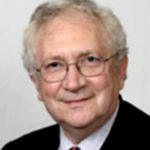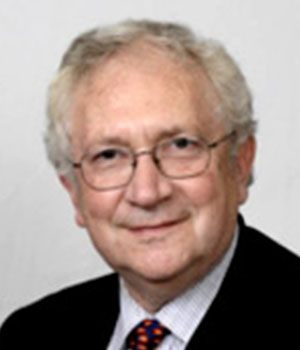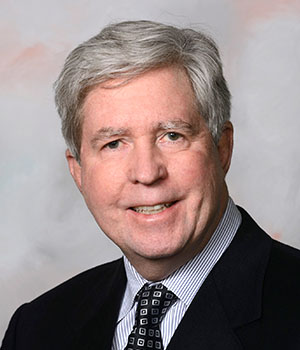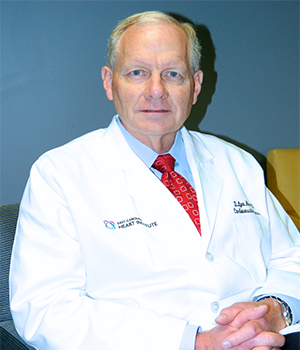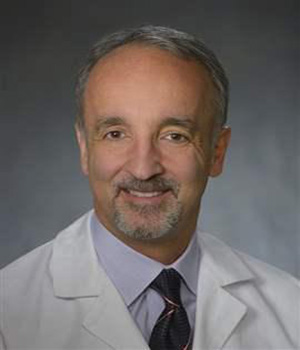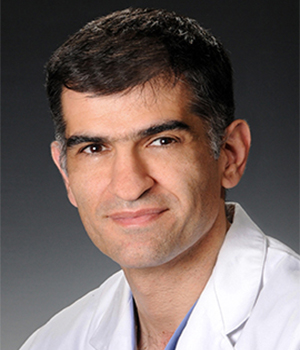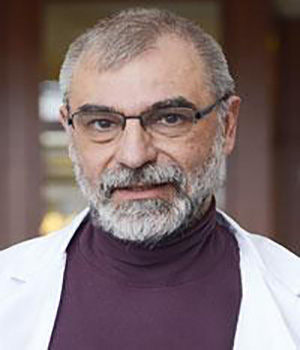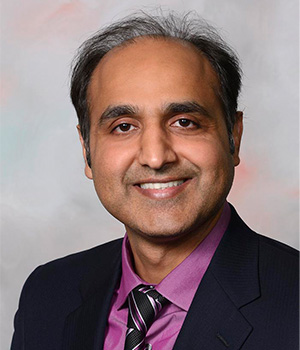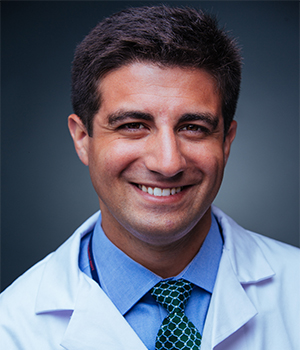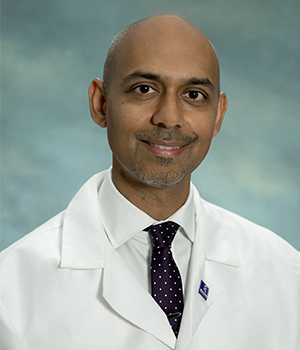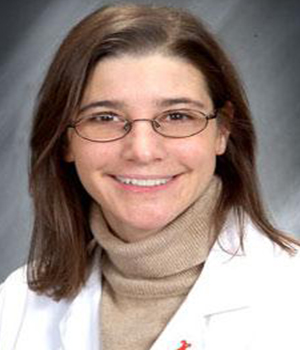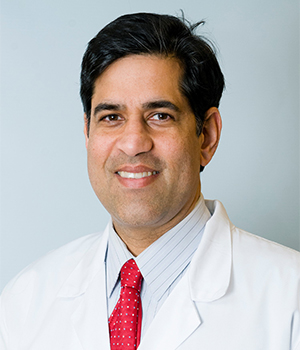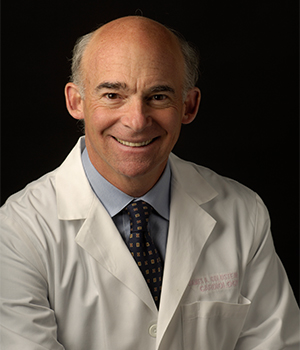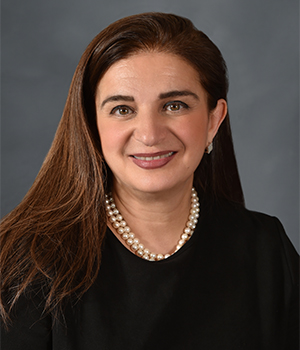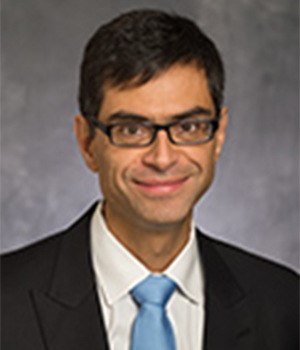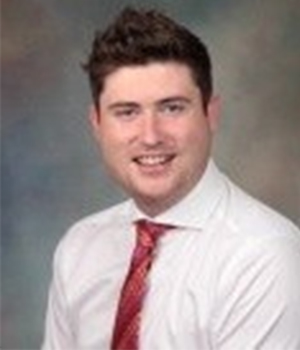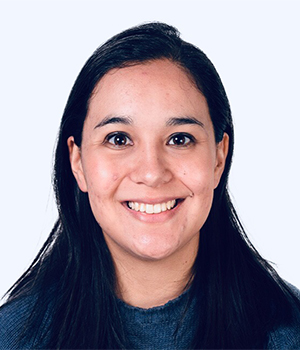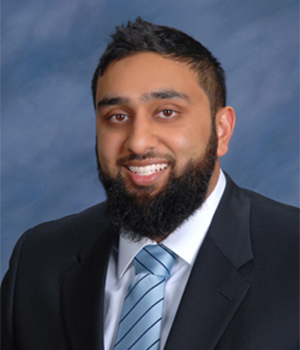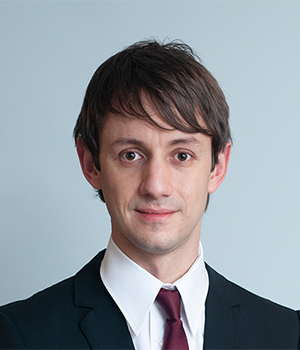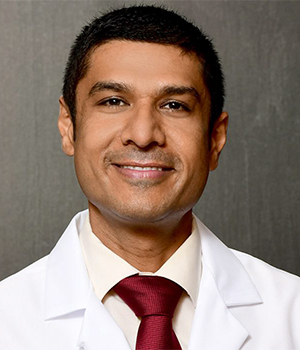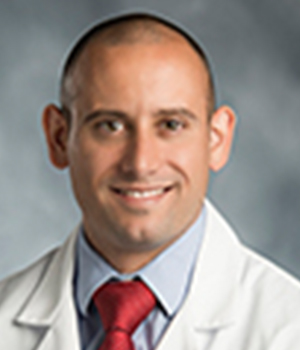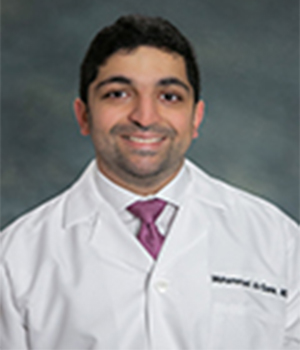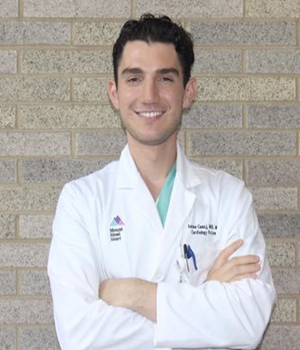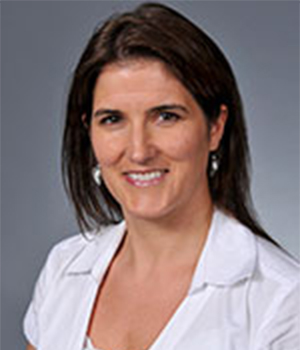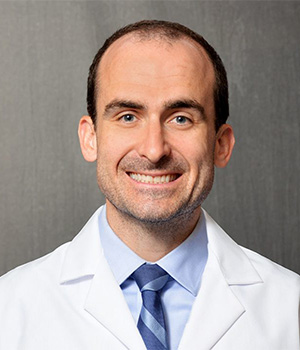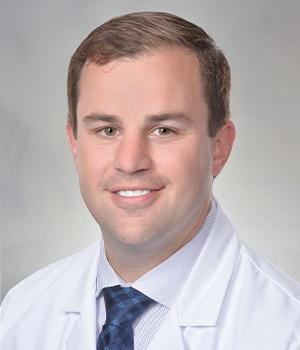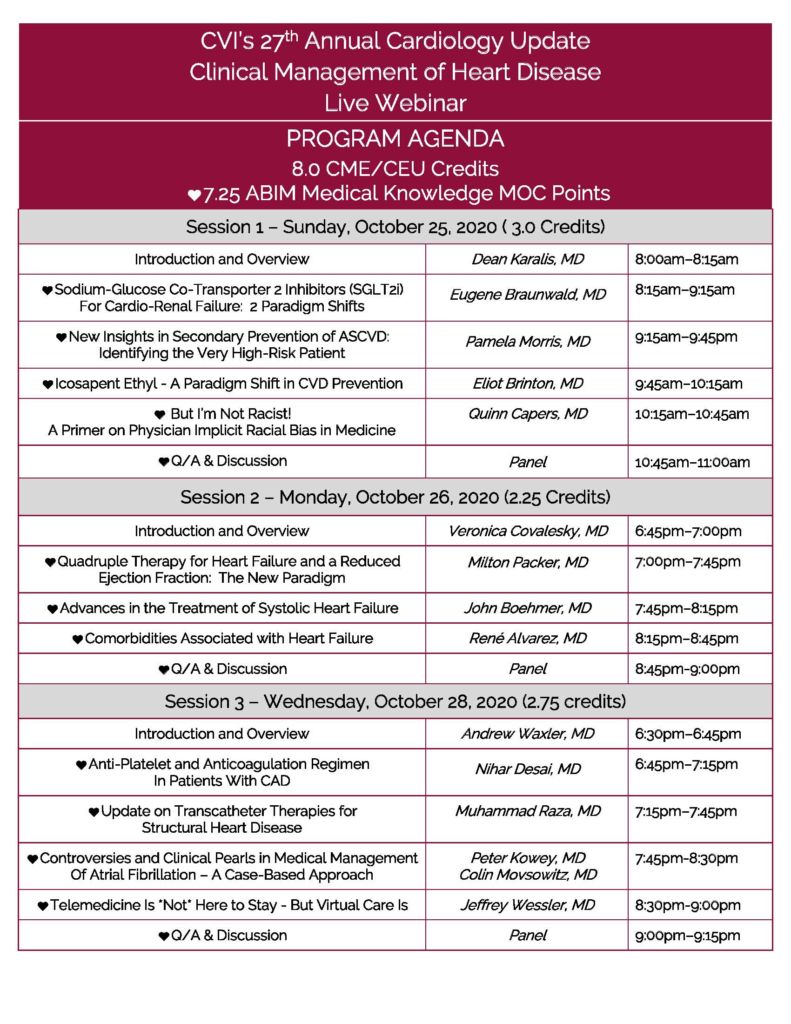Overview
CVI’s 5th Annual Cardiology Fellows Program: “What Every (Interventional) Cardiology Fellow Needs to Know” is a multi-session series of free, interactive, webinars offered by the Cardiovascular Institute of Philadelphia. Our target audience includes interventional and general cardiology fellows with an interest in interventional cardiovascular medicine. Each of our interactive CVI Fellows sessions is 60-90 minutes and features concise, practical lectures delivered by an impressive faculty of nationally recognized thought leaders in the diagnosis and management of coronary and structural disease. Sessions are moderated by CVI Interventional Cardiology Program Directors, with cases presentated by a diverse group of cardiology fellows from the Greater Philadelphia Region and across the U.S. Many of our sessions incorporate audience polling and other interactive tools, and offer ample time for audience Q&A, to enhance program interaction.
See below for details on our first 8 sessions.
Session 8 – Tuesday December 7, 2021 at 6:45pm – “Conundrum of Cardiogenic Shock”
Session Description
Despite enormous advances in the therapy of acute myocardial infarction, with marked reduction in death, the mortality for patients with cardiogenic shock remains unacceptable high. In this interactive program, the definition, classification and new approaches to therapy of cardiogenic shock will be discussed.
Learning Objectives
After viewing this session, attendees will be better able to:
- Describe the definition and pathophysiology of cardiogenic shock due to ischemic and non ischemic causes
- Utilize appropriate revascularization strategies for shock due to myocardial infarction
- Select appropriate mechanical circulatory support devices, including intra-aortic balloon counterpulsation, axial flow pumps ( Impella), left atrial-femoral bypass (Tandem Heart) and ECMO.
This session made possible in part through an Elite Exhibit from:

View Recorded Session 7 – 11/16/2021
Tuesday November 16, 2021 at 6:45pm
“Diagnosis and Management of Pulmonary Embolism”
Guest Faculty & Moderator

Jay Giri, MD
University of Pennsylvania
Moderator

Bryan Kluck, DO
Fellow Case Presenters
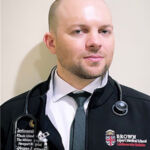

Storm de Klerk, MD Hillary Cox-Johnston, MD
Session Description
This interactive CVI Fellows session includes case presentations by fellows and a state-of-the-art review on the diagnosis, classification, and management of patients with acute pulmonary embolism.
Learning Objectives
After viewing this session, attendees will be better able to:
- Describe the clinical presentation, classification, and pathophysiology of acute pulmonary embolism
- Explain the utility of various diagnostic modalities
- Select the most appropriate therapeutic approach, including catheter based and surgical therapies
View Recorded Session 6 – 10/19/21
Tuesday October 19, 2021 at 6:45pm
“Treatment of Patients with Aortic Stenosis-from Hemodynamic Principles to Valve Replacement in the TAVR Era”
Guest Faculty

James Hermiller, MD
The Heart Center of Indiana
Moderators


Muhammad Raza,MD Paul Fiorilli, MD
Fellow Case Presenters


Rim Halaby, MD Kevin Ball, MD
Session Description
This interactive CVI Fellows session focuses on hemodynamic principles and imaging techniques to evaluate AS severity, including the full range of aortic stenosis from normal flow, high gradient AS through low flow, low gradient AS. The evaluation and workup of the AS patient will be reviewed, including imaging and planning for TAVR. TAVR procedural techniques and best practices will be discussed, including the challenging situations of coexistent CAD, bicuspid valves, embolic protection and challenging vascular access.
Learning Objectives
After viewing this session, attendees will be better able to:
- Utilize clinical, hemodynamic and imaging findings to assess the severity of aortic stenosis
- Describe the pathophysiology and clinical outcomes of patients with low flow, low gradient AS
- Recognize challenges posed by patients with coexistent CAD, bicuspid valves, challenging vascular access, and to discuss techniques and data for embolic protection for stroke prevention during TAVR
View Recorded Session 5
SESSION 5 – “Complex Coronary Interventions: Prepare for the Worst, Hope for the Best”
Tuesday September 28, 2021 at 6:45pm
“Complex Coronary Intervention:
Prepare for the Worst and Hope for the Best”
Guest Faculty

Emmanouil Brilakis, MD
Minneapolis Heart Institute
Moderators

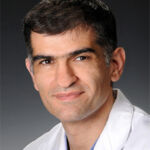
Richard Kovach, MD Antonis Pratsos, MD
Fellow Case Presenters



Yashasvi Chugh, MD Rita Butler, MD Adam Burow, DO
Session Description
The use of adjunctive antiplatelet and antithrombotic strategies for PCI will be the focus of this case-based session. The role of heparin vs bivalirudin, 2b/3a inhibitors, intravenous antiplatelet agents, and the various P2Y12 inhibitors will be discussed. We will compare clopidogrel, prasugrel, ticagrelor, and cangrelor in real-world practice. The critical issue of duration of dual antiplatelet therapy will be reviewed with emphasis on clinical presentation, lesion complexity, bleeding risk and the stent/drug interface. Finally the specific issue of PCI in patients requiring anticoagulation for atrial fibrillation will be addressed.
Learning Objectives
After viewing this session, attendees will be better able to:
- Recognize the benefits and risks of the various anticoagulant and antiplatelet agents used in conjunction with PCI
- Understand the factors which influence drug selection and duration of dual antiplatelet therapy
- Address various strategies when combined anticoagulation and antiplatelet are required, for example, PCI in patients with atrial fibrillation
View Recorded Session 4
SESSION 4 – “Optimal Interventional Pharmacology: Tailoring the Drug to the Specific Patient”
Held Tuesday July 20, 2021 at 6:45pm
“Optimal Interventional Pharmacology: Tailoring the Drug to the
Specific Patient”
Guest Faculty

Roxana Mehran, MD
Mt. Sinai School of Medicine
Moderators


D. Lynn Morris, MD Michael Savage, MD
Panelists


Bryan Kluck, DO Alec Vishnevsky, MD
Fellow Case Presenters


Anton Camaj, MD John Lawrence, MD
Session Description
The use of adjunctive antiplatelet and antithrombotic strategies for PCI will be the focus of this case-based session. The role of heparin vs bivalirudin, 2b/3a inhibitors, intravenous antiplatelet agents, and the various P2Y12 inhibitors will be discussed. We will compare clopidogrel, prasugrel, ticagrelor, and cangrelor in real-world practice. The critical issue of duration of dual antiplatelet therapy will be reviewed with emphasis on clinical presentation, lesion complexity, bleeding risk and the stent/drug interface. Finally the specific issue of PCI in patients requiring anticoagulation for atrial fibrillation will be addressed.
Learning Objectives
After viewing this session, attendees will be better able to:
- Recognize the benefits and risks of the various anticoagulant and antiplatelet agents used in conjunction with PCI
- Understand the factors which influence drug selection and duration of dual antiplatelet therapy
- Address various strategies when combined anticoagulation and antiplatelet are required, for example, PCI in patients with atrial fibrillation
View Recorded Session 3
SESSION 3 – “How Should I Use FFR/iFR, IVUS, OCT and NIRS In Preparation for PCI And to Assess My Results”
Held Tuesday June 15, 2021 at 6:45pm
“How Should I Use FFR/IFR, IVUS, OCT and NIRS in Preparation for PCI and to Assess My Results”
Guest Faculty

James Goldstein, MD
Beaumont Health
Moderators


Sahil Banka, MD Ellen Keeley, MD
Fellow Case Presenters
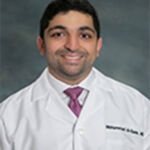


Mohammad AlSarie MD Jason Schott, DO Morgan Randall, MD
SESSION DESCRIPTION
This CVI Fellows 2021 interactive session reviews the scientific basis for and clinical importance of the various imaging technologies in pre-PCI assessment of lesion characteristics and lesion severity. Additionally, the evaluation of post procedure results to minimize the risks of stent thrombosis and restenosis will be discussed.
Learning Objectives
After viewing this session, attendees will be better able to:
- Describe the role of coronary imaging technologies in real work clinical practice
- Select the most appropriate technology to characterize lesions prior to and after PCI
View Recorded Session 2
SESSION 2 – “Fundamentals of Coronary Intervention: How to Fly on My Own”
Session Description
This CVI Fellows 2021 interactive session teaches the basics for achieving a safe and successful PCI, beginning with optimal angiographic views, and following through to definitive treatment and procedure completion. Specifics will involve basic decisions on vascular access site and guide catheter choice. Techniques for optimal visualization of the coronary arteries with focus on accurate target lesion assessment will be discussed. Balloon and stent choices, as well as when adjunctive therapies such as atherectomy might be useful will be covered. Specific attention as to how these choices contribute to successful stent delivery, optimal deployment and long-term patency will also be a point of focus.
Learning Objectives
After viewing this session, attendees will be better able to:
- Describe techniques for accurate lesion/vessel assessment and optimal coronary revascularization
- Discuss how to logically choose interventional devices including guide catheters, wires, stents, and atherectomy devices, rotational, orbital and lithotripsy
- Explain the techniques that will result in successful stent delivery and optimal stent deployment
View Recorded Session 1
SESSION 1 – “The Art and Science of STEMI”
Session Description
This CVI Fellows ‘21 session provides an in-depth review of the critical issues in STEMI treatment based on the most recent science and guideline recommendations. This interactive session incorporates fellow case presentations, and focused expert lecture and comments with ample opportunities for audience questions. Specific topics to be addressed during this session include:
- Emergency pharmacologic management
- Choice of antiplatelet and anticoagulant drugs: beta blockers, ACE/ARB inhibitors, statins
- Choice of stents and new stent technologies including the status of thrombus removal and revascularization strategies in patients with multi-vessel disease.
- Aftercare and follow up including time course of myocardial stunning, indications for defibrillators, the problem of LV thrombus.
Learning Objectives: After viewing this session, attendees will be better able to:
- Perform effective reperfusion of myocardium at risk
- Select optimal stent strategy
- Select patients for non-culprit vessel PCI- who is a candidate, and when to perform








